-
- About the Department
- Vision
- Mission
- Program Educational Objectives (PEOs)
- Program Outcome (POs)
- Program Specific Outcomes (PSOs)
- Faculty Of Electrical Engineering
- Magazines
- Syllabus & Course Outline
- Laboratories
- Practices & Innovation in Teaching Learning
- Professional Society
- Departmental Activities(Guest Lectures & Industrial Visits)
- Academic Calendar
- Project
- Research & Development
Department of Mechanical Engineering
Technical engineering is one of the oldest and broadest engineering disciplines. It applies the principles of physics and material science for the analysis, design, manufacturing, and maintenance of mechanical systems. Mechanical engineers use the core concepts of engineering like mechanics, kinematics, thermodynamics, material science, and structural analysis along with tools like computer-aided engineering and product life cycle management to design and analyze manufacturing plants, industrial equipment and machinery, heating and cooling systems, transport systems, aircraft, watercraft, robotics, medical devices and more.
Vision
To provide highly competent and efficient Mechanical Engineers to meet the ever-changing needs of the industry, society and nation with incorporation of professional skills and ethical values.
Mission
- M1-To develop an atmosphere with efficient teaching and learning process along with multidisciplinary approaches to face technical challenges in the field of Mechanical Engineering.
- M2- Motivate students to pursue higher education and research in Mechanical Engineering domains and to excel in professional and entrepreneurial careers.
- M3- To establish institute-industry interaction for practical exposure and to gain an instinct of real life problems in mechanical based industries.
- M4-Inculcate leadership skills with ethical values and spirit of teamwork.
Program Educational Objectives (PEOs)
- PEO1:-Graduates will be able to apply their knowledge of Mechanical Engineering to solve real-world engineering problems.
- PEO2:-Graduates will have an incumbent sense of leadership and communication skills to work individually as well as in teams.
- PEO3:-Graduates will be competent to tackle complex problems of Mechanical Engineering along with professional ethics and passion for lifelong learning.
Program Outcome (POs)
Engineering knowledge
Apply the knowledge of mathematics, science, engineering fundamentals, and an engineering specialization to the solution of complex engineering problems.
Problem analysis
Identify, formulate, review research literature, and analyse complex engineering problems reaching substantiated conclusions using first principles of mathematics, natural sciences, and engineering sciences.
Design/development of solutions
Design solutions for complex engineering problems and design system components or processes that meet the specified needs with appropriate consideration for the public health and safety, and the cultural, societal, and environmental considerations.
Conduct investigations of complex problems
Use research-based knowledge and research methods including design of experiments, analysis and interpretation of data, and synthesis of the information to provide valid conclusions.
Modern tool usage
Create, select, and apply appropriate techniques, resources, and modern engineering and IT tools including prediction and modelling to complex engineering activities with an understanding of the limitations.
The engineer and society
Apply reasoning informed by the contextual knowledge to assess societal, health, safety, legal and cultural issues and the consequent responsibilities relevant to the professional engineering practice.
Environment and sustainability
Understand the impact of the professional engineering solutions in societal and environmental contexts, and demonstrate the knowledge of, and need for sustainable development.
Ethics
Apply ethical principles and commit to professional ethics and responsibilities and norms of the engineering practice.
Individual and teamwork
Function effectively as an individual, and as a member or leader in diverse teams, and in multidisciplinary settings.
Communication
Communicate effectively on complex engineering activities with the engineering community and with society at large, such as, being able to comprehend and write effective reports and design documentation, make effective presentations, and give and receive clear instructions.
Project management and finance
Demonstrate knowledge and understanding of the engineering and management principles and apply these to one’s own work, as a member and leader in a team, to manage projects and in multidisciplinary environments.
Life-long learning
Recognize the need for, and have the preparation and ability to engage in independent and life-long learning in the broadest context of technological change.
Program Specific Outcomes (PSOs)
- The ability to acquire skill sets in the streams of environment, energy, thermodynamics, design, manufacturing and industrial engineering to cater societal needs.
- The ability to prepare the students for building their career in field of Mechanical Engineering, pursue higher studies and use their entrepreneurial capability to solve interdisciplinary problems.
Faculty Of Mechanical Engineering
| Name of the Faculty | Designation | Department | Highest Qualification |
| MOHD FAIZUL HASAN | ASST PROFESSOR(HOD) | MECHANICAL ENGINEERING | M TECH |
| MOHAN KUMAR | ASST PROFESSOR | MECHANICAL ENGINEERING | M TECH |
| AJEET KUMAR YADAV | ASST PROFESSOR | MECHANICAL ENGINEERING | M TECH |
| ASHISH DWIVEDI | ASST PROFESSOR | MECHANICAL ENGINEERING | M TECH |
| MAHESHWAR DAYAL GUPTA | ASST PROFESSOR | MECHANICAL ENGINEERING | M TECH |
| VINAY KUMAR SHUKLA | ASST PROFESSOR | MECHANICAL ENGINEERING | M TECH |
| AJAI KUMAR SINGH | ASST PROFESSOR | MECHANICAL ENGINEERING | M TECH |
| SHASHANK DEO | ASST PROFESSOR | MECHANICAL ENGINEERING | M TECH |
| SHAILENDRA SINGH | ASST PROFESSOR | MECHANICAL ENGINEERING | M TECH |
| SYED MOHD FARHAN | ASST PROFESSOR | MECHANICAL ENGINEERING | M TECH |
| JITENDRA GUPTA | ASST PROFESSOR | MECHANICAL ENGINEERING | M TECH |
| FAIZAN AHMAD | ASST PROFESSOR | MECHANICAL ENGINEERING | M TECH |
| DURGESH VERMA | ASST PROFESSOR | MECHANICAL ENGINEERING | M TECH |
| ANURAG PANDEY | ASST PROFESSOR | MECHANICAL ENGINEERING | M.TECH |
| RAVISHANKAR VISHWAKARMA | ASST PROFESSOR | MECHANICAL ENGINEERING | M.TECH |
| VINAYI KUMAR SRUVASTAVA | ASST PROFESSOR | MECHANICAL ENGINEERING | M.TECH |
Syllabus & Course Outline
Laboratories
- Mechanical Engineering Lab
- Fluid Machinery Lab
- Refrigeration and Air Conditioning Lab
- Material Science & Testing Laboratory
- Measurement, Meteorology & Control Lab
- Applied Thermodynamics Lab
- Fluid Mechanics Lab
- Heat & Mass Transfer Laboratory
- Manufacturing Science Lab
- Central Workshop
Practices & Innovation in Teaching Learning
RRIMT adopts a comprehensive and student-centered approach to teaching and learning, ensuring that our students are equipped with both the theoretical foundation and practical skills necessary to succeed in the competitive field of software development. Our teaching-learning methodologies are designed to promote critical thinking, problem-solving, hands-on experience, and industry relevance.
- Student-Centered Learning Approach
We follow a student-centered approach that encourages active participation, deep learning, and collaborative efforts. This methodology aligns with the current trends in education and enhances the overall learning experience by promoting greater engagement with the subject matter.
-
-
- Interactive Lectures
-
-
-
- Project-Based Learning
-
- Blended Learning
A combination of traditional classroom learning and online resources is employed to cater to different learning styles and preferences. Blended learning ensures that students not only grasp foundational concepts but also have access to additional learning material such as online tutorials, videos, and software development tools.
-
-
- e-Learning Platforms
-
-
-
- Flipped Classroom Model
-
- Hands-On Learning
In the software branches, practical learning is at the core of our methodology. We provide students with the necessary tools, platforms, and environments to apply the concepts they learn in real-time.
-
-
- Laboratory Work
-
-
-
- Industry Tools & Software
-
- Collaborative Learning and Peer Interaction
We emphasize collaborative learning, where students work in teams, mimicking industry settings. This approach develops their interpersonal and communication skills, both of which are crucial in the software development field.
-
-
- Group Projects and Hackathons
-
-
-
- Peer Review & Code Sharing
-
- Industry-Institute Interface
A key element of our teaching-learning methodology is maintaining close ties with the industry. This ensures that students are exposed to the latest trends, tools, and technologies used in the software industry.
-
-
- Industrial Visits
-
-
-
- Guest Lectures and Workshops
-
-
-
- Internships
-
- Continuous Assessment and Feedback
Assessment is an ongoing process designed to evaluate both theoretical understanding and practical skills development.
-
-
- Formative Assessments: Regular quizzes, assignments, presentations, and coding challenges assess students’ understanding and progress throughout the course.
- Summative Assessments: At the end of each semester, students undergo final exams and major projects to demonstrate their competency in software engineering concepts.
- Feedback Mechanisms: Continuous feedback from faculty, industry mentors, and peer reviews is incorporated to guide students and improve their performance.
-
- Industry-Relevant Curriculum
The curriculum is designed to match the current needs and trends of the software industry, ensuring that students are well-prepared to tackle real-world software engineering challenges.
-
-
- Modular Approach
-
-
-
- Capstone Projects
-
- Outcome-Based Education (OBE)
Our teaching-learning methodology is in line with the Outcome-Based Education (OBE) framework, which focuses on the outcomes and results of the learning process. The curriculum and teaching methods are aligned with specific program outcomes (POs) and program educational objectives (PEOs), ensuring that graduates meet the professional, ethical, and technical expectations of the software industry.
At R.R. Group of Institutions, we are committed to delivering a high-quality education in Software Engineering through an innovative and effective teaching-learning methodology. Our approach integrates theoretical knowledge with practical experience, ensuring that our students are not only prepared to meet the challenges of the industry but also equipped to lead and innovate in the evolving field of software development.
Key Areas of Study In Mechanical Engineering
- Structural Engineering – Design and analysis of buildings, bridges, and other structures.
- Geotechnical Engineering – Study of soil and foundations for supporting structures.
- Transportation Engineering – Planning, design, and management of transport systems.
- Environmental Engineering – Waste management, pollution control, and sustainable development.
- Water Resources Engineering – Hydraulics, irrigation, flood control, and water management.
- Construction Management – Project planning, cost estimation, and construction methods.
Surveying & Geomatics – Land surveying, GPS, and remote sensing technologies.
Career Opportunities
Mechanical Engineers are required in all manufacturing facilities. The working criteria of a mechanical engineer change according to the type and domain of the company they are working with and the area of specialization. In a broader sense, it can be said that a mechanical engineer works on the design and control of a system that goes into the process of manufacturing the machinery and product. He tests new systems for feasibility and efficiency and carries out quality management and improvement process.
There is tremendous scope for mechanical engineers in automobile engineering, cement industry, steel, power sector, hydraulics, manufacturing plants, drilling and mining industry, petroleum, aeronautical, biotechnology, and many more. Nowadays they are also increasingly needed in the environmental and biomedical fields.
A beginner in Mechanical Engineering can opt for various job openings such as Maintenance Engineer, Safety Engineer, Quality Assurance, CNC Programmer, Jr. Engineer, Design Engineer, CAD/CAM Trainer, Production Supervisor/Engineer, R&D Trainee, etc.
Ranking among the top Mechanical Engineering Colleges in Lucknow, the faculty of this department is always keen to follow new trends and developments of mechanical machines and processes. A remarkable feature of this department is the central workshop which is housed in a separate spacious shed. It has a lathe, slotting and shaping machines, etc. in addition, it has manufacturing science and automobile laboratories. The staff in the central workshop and laboratories of the department is well qualified and experienced to assist the students in their practical classes – another reason why RRIMT is probably the best mechanical engineering college in Lucknow!
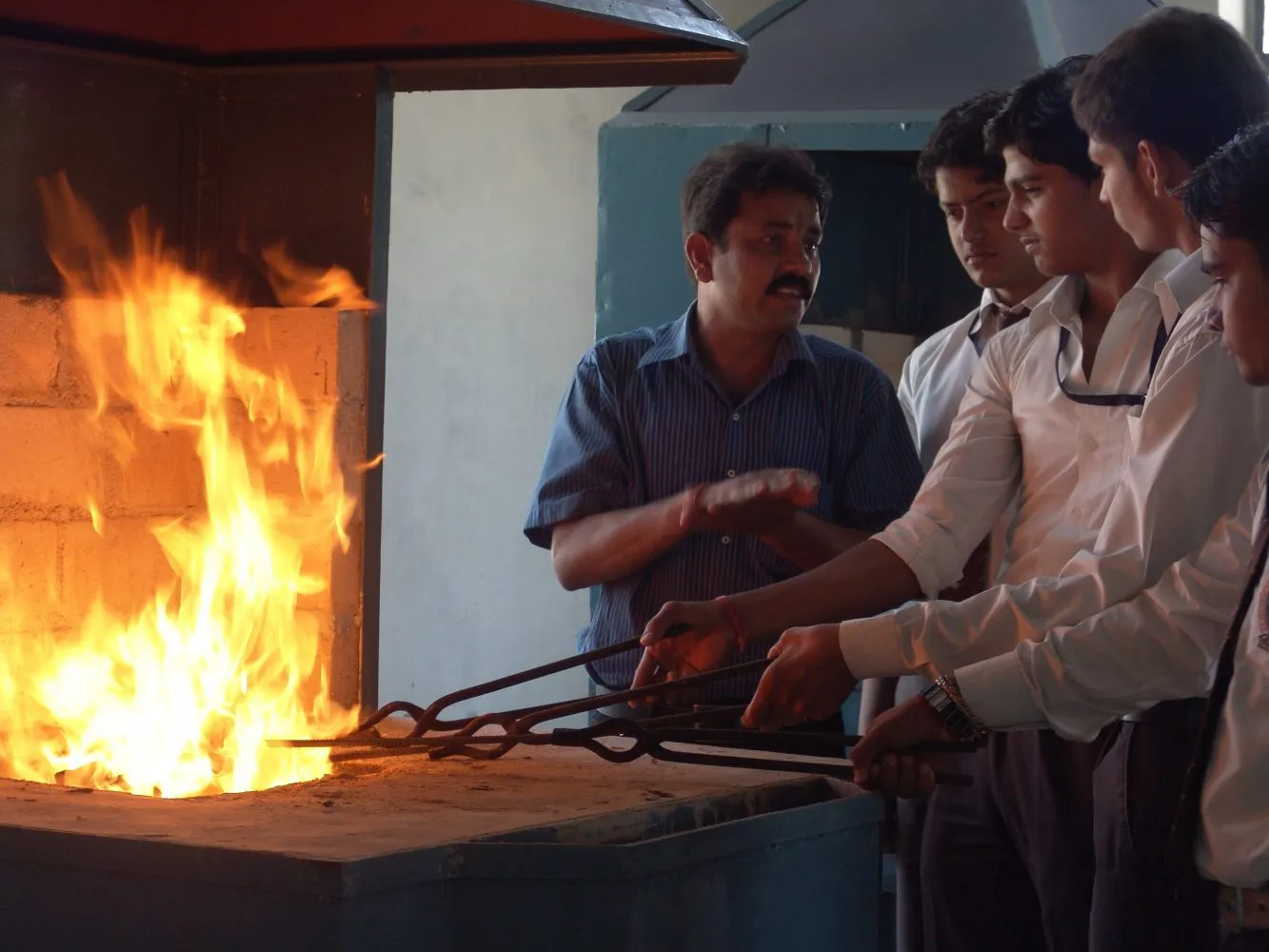
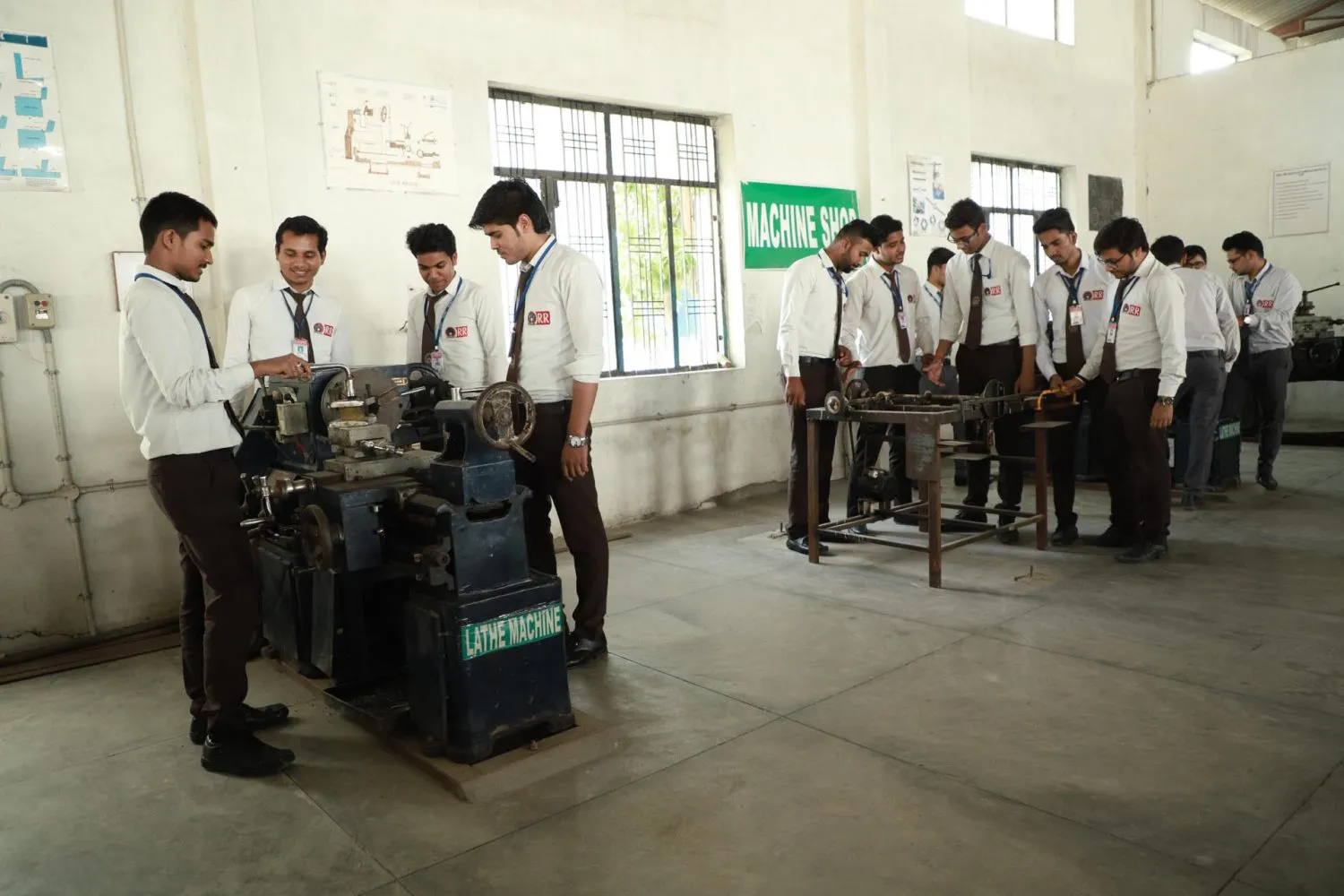
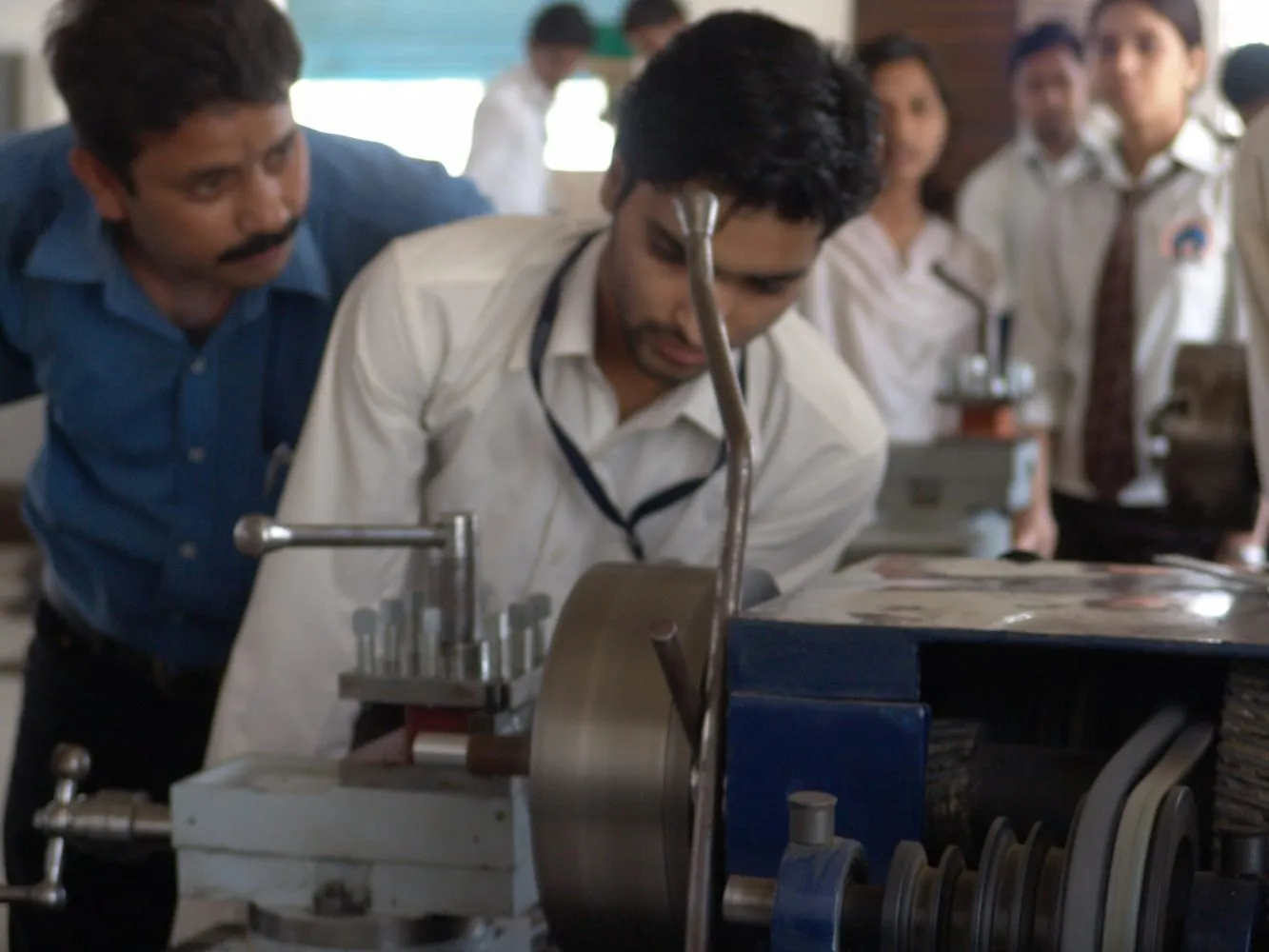
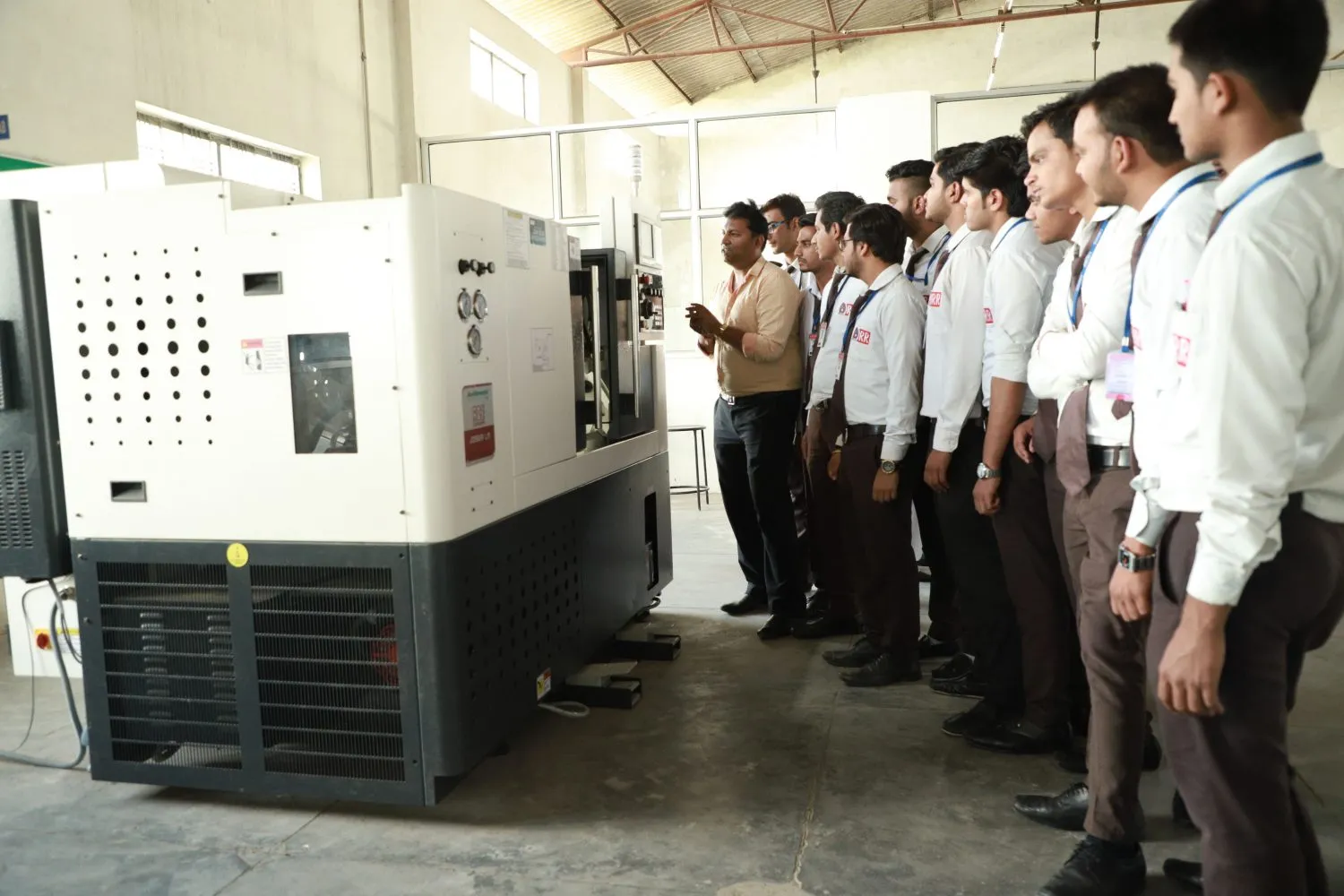
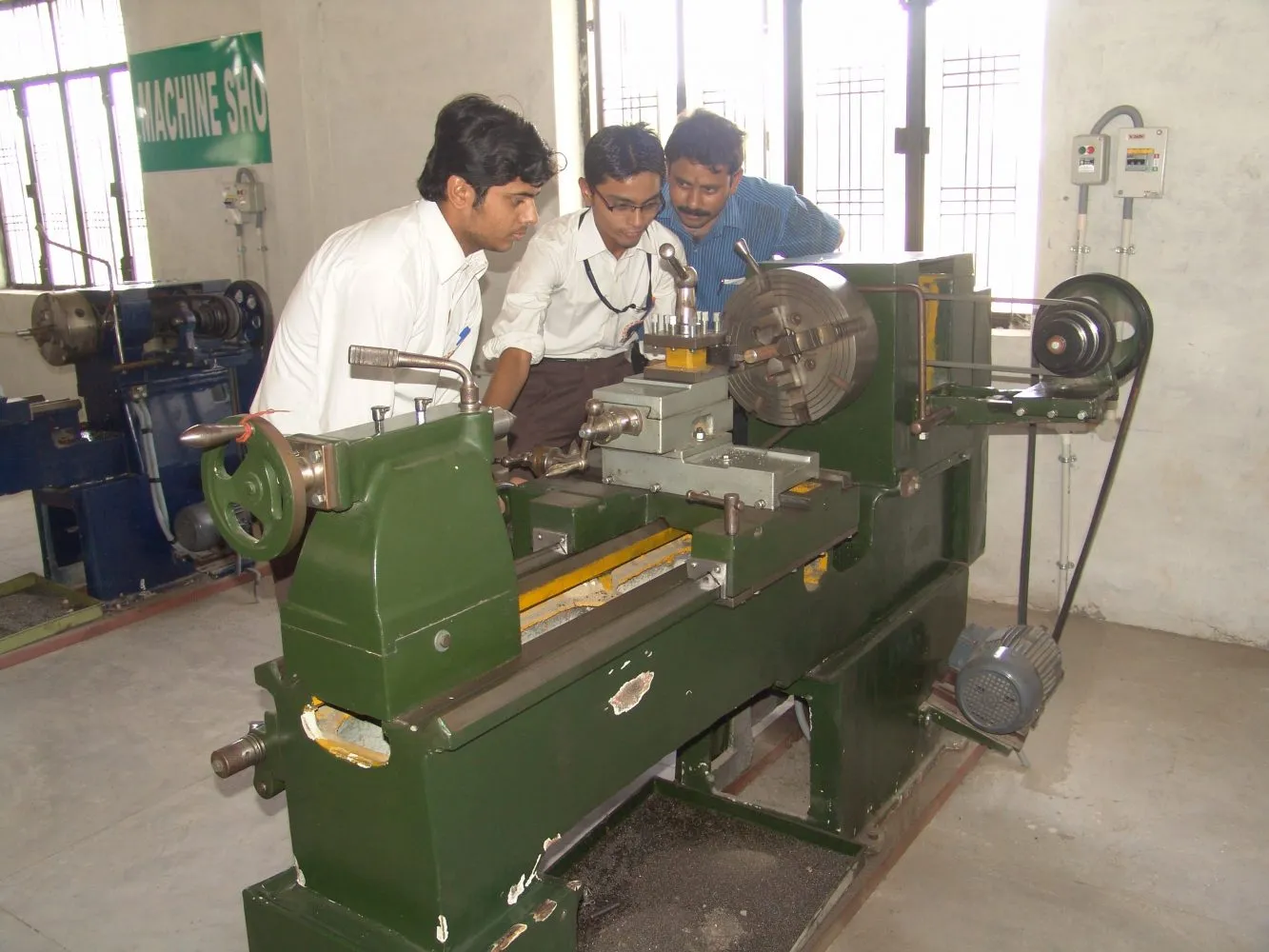
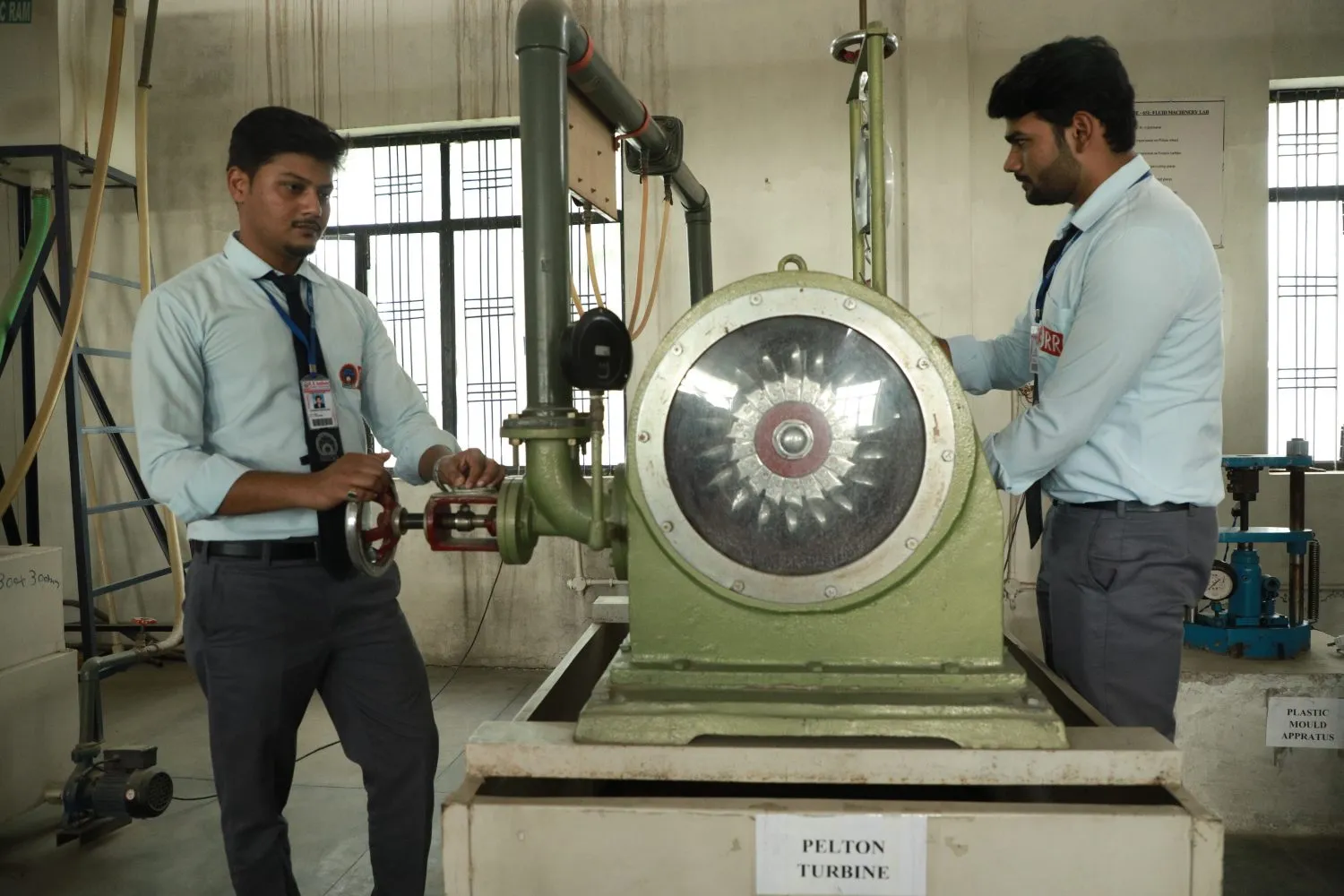
- Address
NH-24, Bakshi Ka Talab, Sitapur Road, Lucknow-226201 (UP) India - Phone
8756008853, 9161888853, 18001020833 (Toll Free) - Email
admissions@rrgi.in - rrimtedu@gmail.com
Department of Mechanical Engineering
Vision
To provide highly competent and efficient mechanical engineers to meet the ever-changing needs of the industry, society and nation with incorporation of professional skills and ethical values.
Mission
- To develop an atmosphere with efficient teaching and learning process along with multidisciplinary approaches to face technical challenges.
- Motivate the students to pursue higher education and excel in a professional and entrepreneurial career.
- To establish institute-industry interaction for practical exposure and to gain an instinct of real-life problems.
- Inculcate leadership skills with ethical values and a spirit of teamwork.
Program Educational Objectives (PEOs)
- Graduates will be able to apply their knowledge of mechanical engineering to solve real-world engineering problems.
- Graduates will have an incumbent sense of leadership and communication skills to work individually as well as in a team.
- Graduates will be competent to tackle complex problems of mechanical engineering along with professional ethics and a passion for lifelong learning.
Program Outcome (POs)
Identify, formulate, review research literature, and analyse complex engineering problems reaching substantiated conclusions using first principles of mathematics, natural sciences, and engineering sciences.
Design solutions for complex engineering problems and design system components or processes that meet the specified needs with appropriate consideration for the public health and safety, and the cultural, societal, and environmental considerations.
Use research-based knowledge and research methods including design of experiments, analysis and interpretation of data, and synthesis of the information to provide valid conclusions.
Create, select, and apply appropriate techniques, resources, and modern engineering and IT tools including prediction and modelling to complex engineering activities with an understanding of the limitations.
Apply reasoning informed by the contextual knowledge to assess societal, health, safety, legal and cultural issues and the consequent responsibilities relevant to the professional engineering practice.
Understand the impact of the professional engineering solutions in societal and environmental contexts, and demonstrate the knowledge of, and need for sustainable development.
Apply ethical principles and commit to professional ethics and responsibilities and norms of the engineering practice.
Function effectively as an individual, and as a member or leader in diverse teams, and in multidisciplinary settings.
Communicate effectively on complex engineering activities with the engineering community and with society at large, such as, being able to comprehend and write effective reports and design documentation, make effective presentations, and give and receive clear instructions.
Demonstrate knowledge and understanding of the engineering and management principles and apply these to one’s own work, as a member and leader in a team, to manage projects and in multidisciplinary environments.
Recognize the need for, and have the preparation and ability to engage in independent and life-long learning in the broadest context of technological change.
[mk_padding_divider]
PROGRAM SPECIFIC OUTCOME (PSOs)
- The ability to acquire skill sets in the streams of environment, energy, thermodynamics, design, manufacturing and industrial engineering to cater societal needs.
- The ability to prepare the students for building their career in field of Mechanical Engineering, pursue higher studies and use their entrepreneurial capability to solve interdisciplinary problems.
FACULTY OF Mechanical Engineering

DEVENDRA SINGH CHAUHAN
ASST PROFESSOR (M.Tech.)

GAURAV KUMAR SHUKLA
ASST PROFESSOR (M.Tech.)

MAHESHWAR DAYAL GUPTA
ASST PROFESSOR (M.Tech.)

VIRENDRA KUMAR YADAV
ASST PROFESSOR (M.Tech.)

JITENDRA GUPTA
ASST PROFESSOR (M.Tech.)

SANDEEP KUMAR CHAUHAN
ASST PROFESSOR (M.Tech.)

KUNWAR DIGAMBER SINGH
ASST PROFESSOR (M.Tech.)

FAIZAN AHMAD
ASST PROFESSOR (M.Tech.)

MULAYAM KUMAR
ASST PROFESSOR (M.Tech.)

NIHARIKA MISHRA
ASST PROFESSOR (M.Tech.)

VINAY KUMAR SHUKLA
ASST PROFESSOR (M.Tech.)

MAYANK SHARMA
ASST PROFESSOR (M.Tech.)

PANKAJ KUMAR SHARMA
ASST PROFESSOR (M.Tech.)

ASHISH KUMAR
ASST PROFESSOR (M.Tech.)

MOHD FAIZUL HASAN
ASST PROFESSOR (M.Tech.)

KARUNESH BAHADUR
ASST PROFESSOR (M.Tech.)

VINOD KUMAR
ASST PROFESSOR (M.Tech.)
SCOPE OF MECHANICAL ENGINEERING
Mechanical Engineers are required in all manufacturing facilities. The working criteria of a mechanical engineer change according to the type and domain of the company they are working with and the area of specialization. In a broader sense, it can be said that a mechanical engineer works on the design and control of a system that goes into the process of manufacturing the machinery and product. He tests new systems for feasibility and efficiency and carries out quality management and improvement process.
There is tremendous scope for mechanical engineers in automobile engineering, cement industry, steel, power sector, hydraulics, manufacturing plants, drilling and mining industry, petroleum, aeronautical, biotechnology, and many more. Nowadays they are also increasingly needed in the environmental and biomedical fields.
A beginner in Mechanical Engineering can opt for various job openings such as Maintenance Engineer, Safety Engineer, Quality Assurance, CNC Programmer, Jr. Engineer, Design Engineer, CAD/CAM Trainer, Production Supervisor/Engineer, R&D Trainee, etc.
Ranking among the top Mechanical Engineering Colleges in Lucknow, the faculty of this department is always keen to follow new trends and developments of mechanical machines and processes. A remarkable feature of this department is the central workshop which is housed in a separate spacious shed. It has a lathe, slotting and shaping machines, etc. in addition, it has manufacturing science and automobile laboratories. The staff in the central workshop and laboratories of the department is well qualified and experienced to assist the students in their practical classes – another reason why RRIMT is probably the best mechanical engineering college in Lucknow!
The department has the following laboratories fully equipped with all the experimental setups, modern machines, and sophisticated instruments:
- Mechanical Engineering Lab
- Fluid Machinery Lab
- Refrigeration and Air Conditioning Lab
- Material Science & Testing Laboratory
- Measurement, Meteorology & Control Lab
- Applied Thermodynamics Lab
- Fluid Mechanics Lab
- Heat & Mass Transfer Laboratory
- Manufacturing Science Lab
- Central Workshop
Mechanical Engineering graduates may seek job opportunities in manufacturing, automobile, power, refrigeration, and allied industries, designing software, research & development, etc.